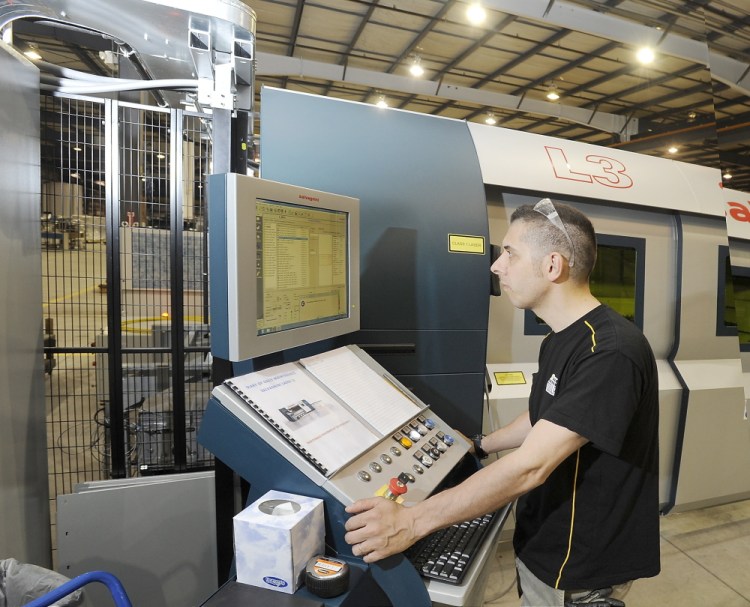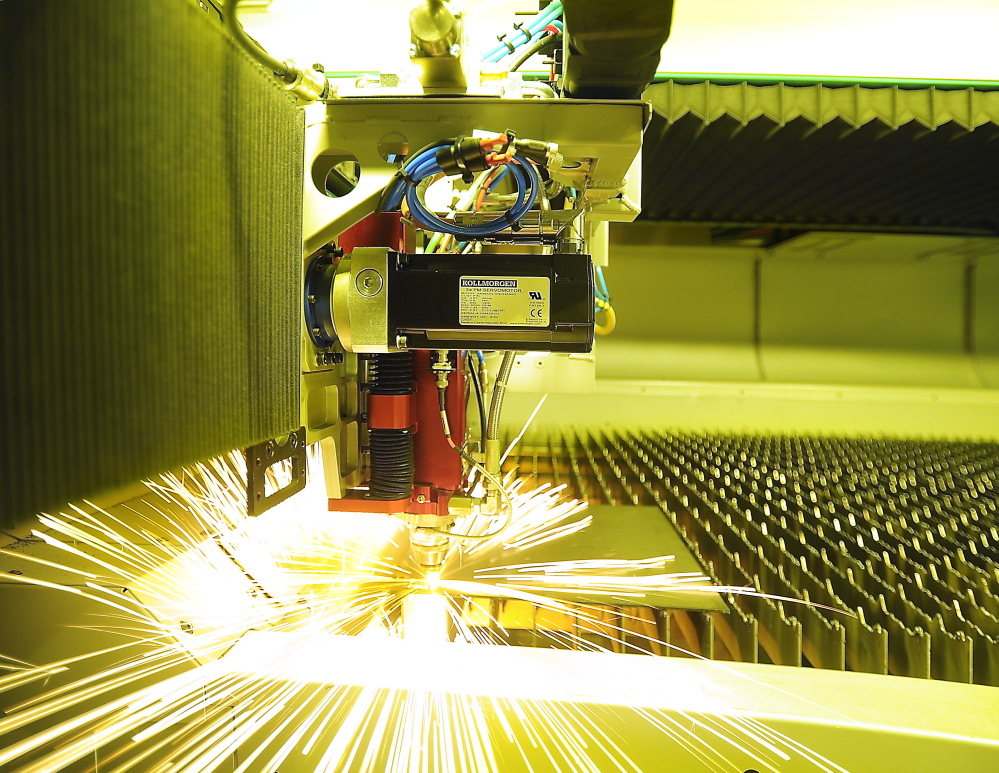Maine’s manufacturers want young people to rethink what it means to work in a factory. It’s no longer a dirty workplace doomed for closure because of outsourcing, they say. Changes in the global marketplace are making it easier for Maine companies with modern equipment to compete globally, and there is growing demand for skilled workers to operate that equipment.
“I appreciate that people’s parents or grandparents may have lost their job to a factory in China, but that is no longer going to happen,” said Roberto Dolci, a business consultant for System Logistics, which is installing $6 million in high-tech manufacturing technology in its Modula plant in Lewiston.
There are 39 Maine companies that have had 866 job openings since Jan. 1, according to a Manufacturers Association of Maine survey last month of its 179 member companies, with an average salary of $49,300.
That’s a 264 percent increase over a December 2013 survey, in which member companies reported 238 job openings.
L.L. Bean has the most job openings at 562, followed by Bath Iron Works, which had 108 openings. Idexx Laboratories in Westbrook reported 62 openings.
The trade group released the survey results in advance of its annual conference, scheduled for Thursday at Pineland Farms in New Gloucester.
The group has been trying to convince young people that there are good jobs available in manufacturing. Its “Dream it, do it” program aims to change the image of manufacturing for educators, parents and students.
“There is a narrative out there that there are no jobs in Maine,” said Derek Volk, who serves on the group’s board and runs Volk Packaging Corp. in Biddeford. “It’s just not true. There are good jobs. They are right here in Maine.”
A group of students last year toured the Volk plant as part of the “Dream it, do it” campaign, which is sponsored by the Manufacturing Institute, a national group.
During Thursday’s summit, the Falmouth and Gorham high school robotics team will demonstrate robots the team has built. In addition, the Maine Manufacturers Association is developing a Web-based seminar to help companies hire interns. The group is also working with local schools and colleges to connect students to available internships and to distribute student resumes to member companies.
Manufacturing in Maine has been declining since the 1970s. The decline began with companies producing textiles, footwear, leather tanning and apparel, and later spread to manufacturers of forest products, such as lumber and paper, said Glenn Mills, chief economist at the Center for Workforce Research and Information at the Maine Department of Labor.
After the 2008-09 recession, manufacturing employment in Maine stabilized in 2010 at around 50,000 jobs. In 2014, there were 50,300 jobs, with an average wage of $51,400. In 2000, there were 79,400 jobs, with an average wage of $35,400. The Maine Department of Labor projects that by 2022, there will be 46,300 manufacturing jobs.
The increase in average wages may indicate the disappearance of many lower-paying manufacturing jobs, Mills said.
Some traditional Maine industries have been gone for so long that it’s hard for companies to find skilled workers. That’s what happened to Hyperlite Mountain Gear, which manufactures outdoor products in a former textile mill in Biddeford.
Mike St. Pierre, who founded the company in 2010, said he was surprised by how difficult it was to find skilled sewing machine operators in the Biddeford area.
In the 1940s, 12,000 people worked in textile mills in Biddeford and Saco. But production shifted to the South and later overseas, leaving behind 4 million square feet of empty manufacturing space. While the buildings remain, the labor resource in the area has largely disappeared, St. Pierre said.
St. Pierre’s company employs 16 people in production, almost all women, many in their 60s. He said it’s so difficult to find skilled stitchers that he recently hired a consultant who helped him streamline the manufacturing processing so he could maintain production levels with fewer workers.
The difference in labor costs between the U.S. and other countries has narrowed, and the introduction of labor-saving technology, such as robotics, has also lowered the cost of domestic manufacturing, Dolci said.
He said locating production in the U.S. has some big advantages, including easier access to the huge U.S. market and lower risk shipping products domestically rather than from overseas.
The number of manufacturing jobs in Maine will never return to the peak in the 1970s, Dolci said. But the jobs that remain will pay more because they will require more education and higher skill levels.
Rather than working on materials manually, he said, today’s welder operates a laser-cutting machine and must be computer-literate.
Workers are still in the process of installing fully automated equipment at the Modula plant in Lewiston. The equipment lines punch, bend, weld and cut sheet metal for a variety of storage products used in warehouses.
About 40 people work in the plant, about the same number who worked there before the investment. The plant now operates with only one shift, however. Once the new equipment is fully operational, the plant will start a second and then a third shift and also weekend shifts. That means hiring a lot more people, Dolci said.
But the company does not want applicants who believe all they have to do is show up to work, he said. “At this point, with the latest manufacturing technology, the single operator is way more productive than before,” he said. “To be so productive, he needs much higher skill sets.”
Send questions/comments to the editors.





Success. Please wait for the page to reload. If the page does not reload within 5 seconds, please refresh the page.
Enter your email and password to access comments.
Hi, to comment on stories you must . This profile is in addition to your subscription and website login.
Already have a commenting profile? .
Invalid username/password.
Please check your email to confirm and complete your registration.
Only subscribers are eligible to post comments. Please subscribe or login first for digital access. Here’s why.
Use the form below to reset your password. When you've submitted your account email, we will send an email with a reset code.